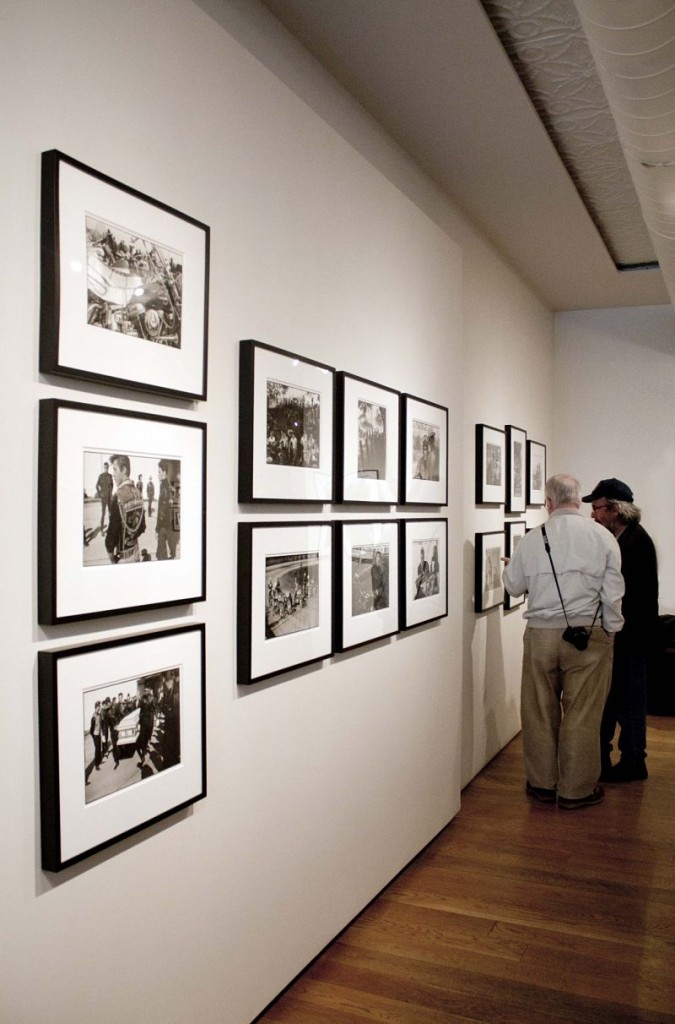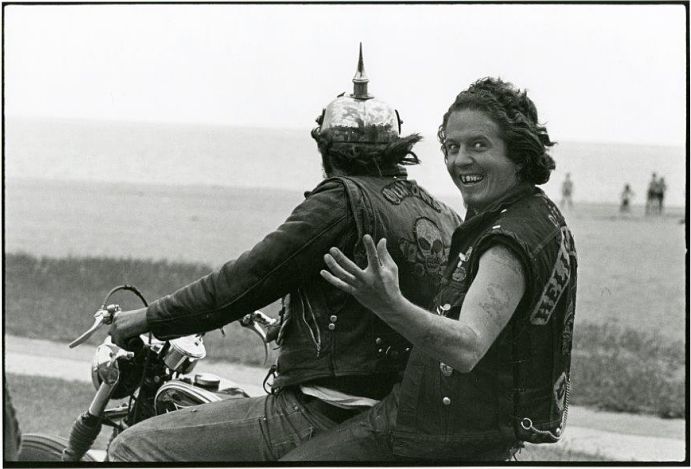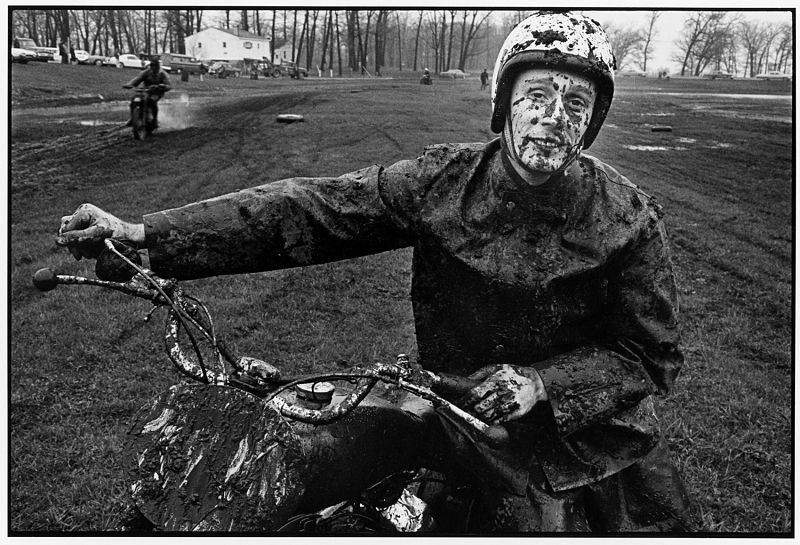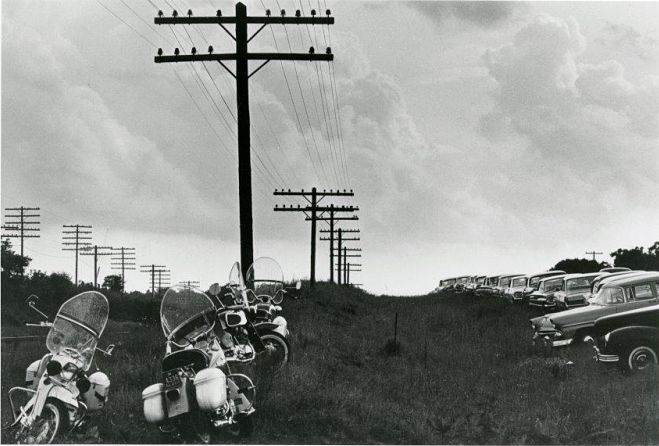 Gallery visitors examing Lyon’s work. Photo: Shellie Zhang
Gallery visitors examing Lyon’s work. Photo: Shellie Zhang
This past weekend, The Bikeriders at the Stephen Bulger Gallery drew in an assortment of visitors from art consoeurs exploring the fruits of CONTACT, passer byers curious of the hype, and fans of motorcycles and biker culture. According to artist Danny Lyon himself, the photographs in this exhibition were “an attempt to record and glorify the life of the American bikerider.” However, this statement is simplifying Lyon’s accomplishments in this body of work. Surpassing mere glorification, Lyon captured the surprisingly humanist nature of the biker counterculture revolution during the 1960s. During this time, Lyon became a member of the Chicago Outlaws motorcycle club and traveled alongside them, sharing their lifestyle. As a result, The Bikeriders encapsulate a more tender side of the rebel group because Lyon was able to get close to the gang in a way others had not been able to. As Martin Parr remarked, The Bikeriders offers an authentic voice about its subjects, “understanding instinctively not only their hopes and aspirations, but also why they were rebelling against all kinds of adult authority.” In this body of work, Lyon exposes the complexity and intimacy within the biker culture by humanizing the individuals in the group and shedding their vicious associations without taking the edge off their badass aura.
 Danny Lyon,Funny Sunny Packing with Zipco, Milwaukee 1966. Copyright Dektol@wordpress.com Courtesy of Etherton Gallery, Tucson
Danny Lyon,Funny Sunny Packing with Zipco, Milwaukee 1966. Copyright Dektol@wordpress.com Courtesy of Etherton Gallery, Tucson
In each image, Lyon demonstrates that the general presumptions surrounding biker gangs are not as clear cut as most would believe them to be. Funny Sunny Packing with Zipco, Milwaukee (1966), depicts a Hell’s Angel biker enthusiastically riding on the same bike as an Outlaw driver. Popular culture would lead many to believe that these two gangs were rival gangs. Many viewers attending the opening began questioning their own knowledge of biker culture upon seeing this image, wondering if they were mistaken or if special circumstances allowed this encounter. No simple answers were provided in the gallery, leaving the visual message that in this moment that Lyon captured, their comradely exceeded any bad blood which may have existed.
 Danny Lyon, Racer, Schereville, Indiana, 1965. © Danny Lyon / Courtesy of Etherton Gallery, Tucson, and Stephen Bulger Gallery, Toronto
Danny Lyon, Racer, Schereville, Indiana, 1965. © Danny Lyon / Courtesy of Etherton Gallery, Tucson, and Stephen Bulger Gallery, Toronto
Another triumph in this series was Lyon’s ability to successfully reveal the underlying innocence within many of his subjects. Racer, Schereville, Indiana (1965) features a young man holding his bike after having ridden through a muddy terrain. At first glance, the black and white image creates the illusion that the mud on the man’s face are splatters of blood – similar to the gruesome images found in so many Hollywood films about bikers. Upon further examination, details within the photograph demonstrate that this is a rather wholesome scene. The man’s white smile shining through his dirtied face shows his boyish charm, playful features, and sincere enjoyment through riding.
 Danny Lyon, Route 90, Alabama, 1964. Copyright Dektol@wordpress.com Courtesy of Etherton Gallery, Tucson
Danny Lyon, Route 90, Alabama, 1964. Copyright Dektol@wordpress.com Courtesy of Etherton Gallery, Tucson
As the only work in the exhibition that doesn’t feature a human subject, Route 90, Alabama (1964) possesses many symbols that offer insight towards Lyon’s idea of biker philosophy. The photograph depicts the wide open space that many have dreamed of with majestic clouds rolling in the sky and a light gleaming from over the horizon. In the corner, bikes stand as a celebration of freedom, nonconformity to mainstream culture and unity within the group. The silhouettes of the electrical poles that adorn the American landscape resemble rows of crosses, suggesting that this lifestyle is their religion and salvation. The lack of human presence further suggests that this evocative and sublime landscape represents something larger than the individuals within the culture.
 Stephen Bulger Gallery owner Stephen Bulger (left) and artist Danny Lyon at the Reception. Photo: Shellie Zhang
Stephen Bulger Gallery owner Stephen Bulger (left) and artist Danny Lyon at the Reception. Photo: Shellie Zhang
Much like Hunter S. Thompson’s Hells Angels, The Bikeriders explores the seductive realm of the biker subculture with a different conclusion than those depicted in popular culture. Lyon offers a romantic insight towards the classic American outlaw and maintains their integrity with signs of compassion. In many ways, Lyon acts as a spokesman for his friends and comrades. By documenting their journeys and re- presenting their way of life to the public, Lyon brings forth evidence that perhaps these individuals do not deserve the negative image that they have been affiliated with.
Shellie Zhang
*Note: The exhibition runs from May 11 – June 15, 2013 at the Stephen Bulger Gallery, 1026 Queen Street West. Hours: Tue – Sat 11 – 6 p.m.
